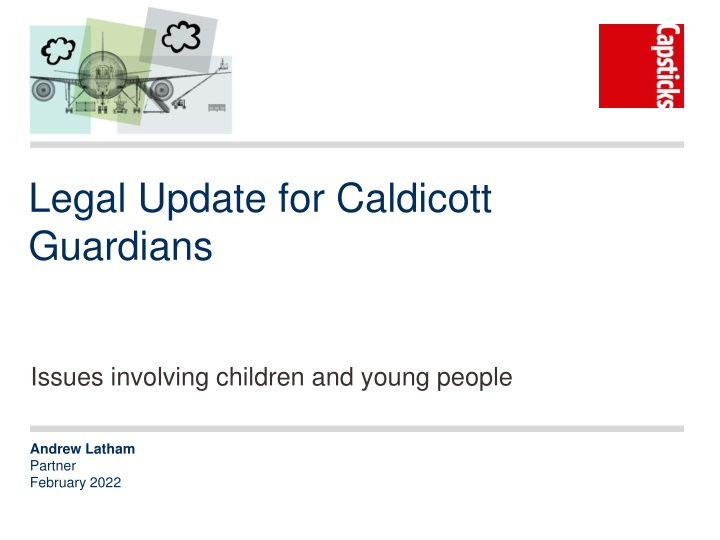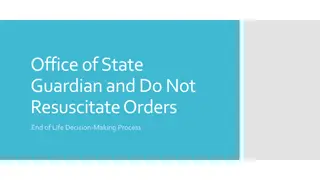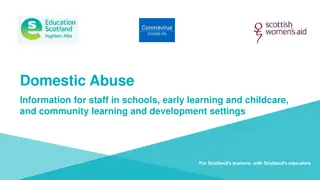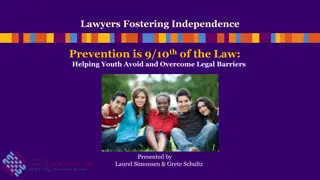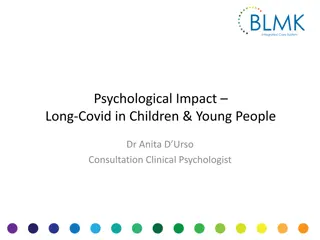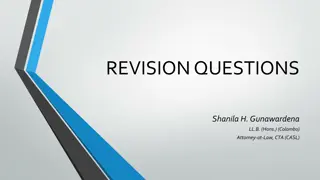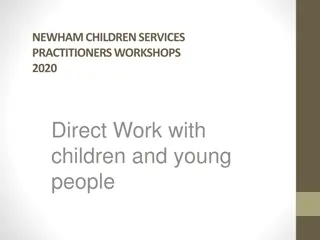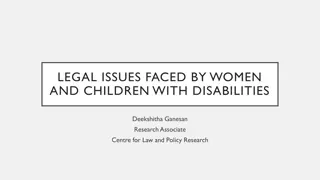Legal Update on Caldicott Guardians: Issues Involving Children and Young People
This legal update covers key issues such as information sharing, the Duty of Candour, consent, data protection, making safe decisions, and resolving disputes relating to children and young people. It also discusses the Caldicott Principles, relevant laws, and guidance in confidentiality, data protection, human rights, decision-making abilities of children, and more.
Download Presentation

Please find below an Image/Link to download the presentation.
The content on the website is provided AS IS for your information and personal use only. It may not be sold, licensed, or shared on other websites without obtaining consent from the author.If you encounter any issues during the download, it is possible that the publisher has removed the file from their server.
You are allowed to download the files provided on this website for personal or commercial use, subject to the condition that they are used lawfully. All files are the property of their respective owners.
The content on the website is provided AS IS for your information and personal use only. It may not be sold, licensed, or shared on other websites without obtaining consent from the author.
E N D
Presentation Transcript
Legal Update for Caldicott Guardians Issues involving children and young people Andrew Latham Partner February 2022
A health warning! Lawyers love text heavy slides
What we will be discussing Information sharing and legal issues in children and young people The Duty of Candour Consent Data Protection issues Making safe(r) decisions and resolving disputes Case study
The Caldicott Principles and Children and Young People Principle 1 - Justify the purpose(s) for using confidential information Principle 6 - Comply with the law Principle 7 - The duty to share information can be as important as the duty to protect patient confidentiality Principle 8: Inform patients and service users about how their confidential information is used Key issues: - Sharing information with parents - Sharing information with other commissioners and providers of care, support and treatment.
What laws and guidance are at play? (1) Confidentiality Data protection Human Rights (Article 8: privacy and family rights of child and parents) Common law issues about child/young person s decision making ability (Gillick), Mental Capacity Act 2005 Children Act 1989 and 2004 powers of parents and public bodies and duties in respect of children Various regulations (some context specific) Professional guidance
What laws and guidance are at play (2) This is not an exhaustive list! Scotland has its own cases and legislation (e.g. statutory capacity presumption at age 12); Wales has some differences to England. How these laws overlap and interact with one another can be very important in respect of Caldicott issues Child s best interests will generally have primacy but what is in the child s best interests?
Confidentiality and decision making a rule of thumb Gillick v West Norfolk Health Authority children aged 15 and under may have capacity to consent to treatment on their own behalf if they have sufficient intelligence, maturity and understanding to decide on the issue in question Family Law Reform Act 1969, s. 8 consent of a minor who has attained the age of sixteen years to any surgical, medical or dental treatment which, in the absence of consent, would constitute a trespass to his person, shall be as effective as it would be if he were of full age MCA 2005 a person aged 16 or over is assumed to have mental capacity as a starting point Rule of thumb: if C/YP can consent to treatment him/herself, s/he can express independent views about associated information sharing
R (Axon) v SoS for Health (2006) (1) SoS had published guidance around sexual health treatment for children and young people. A challenged this and said the Court should declare that clinicians are not under an obligation to keep confidential advice and treatment which he proposed to provide to a young person under the age of 16 in respect of contraception, sexually transmitted infections and abortion and therefore clinicians should not provide such advice and treatment without the parents' knowledge unless to do so would or might prejudice the child's physical or mental health so that it was in the child's best interest not to do so. What did the Court decide?
R (Axon) v SoS for Health (2006) (2) Clinicians are entitled to provide medical advice and treatment on sexual matters to P without a parent's knowledge or consent if satisfied that: P understood all aspects of the advice; The clinician could not persuade P to inform their parents (or allow the clinician to inform them) that P wanted advice and/or treatment on sexual matters; P was very likely to begin or to continue having sexual intercourse with or without contraceptive treatment or treatment for a sexually transmissible illness; Unless P received advice and treatment on the relevant sexual matters, their health was likely to suffer; and P s best interests required them to receive advice and treatment without parental consent or notification
Local Authority X v HI and others (2016) (1) Child I shared a piece of information with professionals. The information was about him himself, not about his parents. He was already subject to ongoing court proceedings relating to residence/welfare. Child I was adamant the information should not be shared with his parents, particularly his father. The local authority considered that whilst they owed a duty of confidentiality to Child I, they were under an duty to disclose the information to his parents because of the disclosure obligations associated with court proceedings. Child I (via his legal guardian) sought to prevent the local authority from sharing the information with his parents. LA applied to Court for directions as to what to do.
Local Authority X v HI and others (2016) (2) Local authority was absolutely right to make this application . Court decided this was a balancing exercise between the child s privacy rights and the fairness of the court proceedings for the parents. Factors: Was the information relevant to the court proceedings? Not really very relevant Would disclosure be likely to cause significant harm to child I? Yes The harm which would be caused by disclosure of information which has very little, if any, relevance to the issues which need to be determined by the court would be wholly disproportionate to any legitimate forensic purposes served.
PD v SD and X local authority (2015) PD aged 16, had been adopted aged 5. PD had gender dysphoria and was referred to the Tavistock. PD s parents struggled with this, and relationship collapsed. PD came to the very clear and very firm conclusion that he no longer wished his parents to be involved in his life and not receive any information about his day-to-day life, nor about his assessment and possible treatment at the Tavistock Clinic or other medical facility. This extended to if he were required to receive emergency medical treatment. Parents (SD) wanted involvement through quarterly updates. The local authority was ordinarily under statutory duties to consult with and give information about P to his parents. Court required to reconcile the LA s duties and wishes of the parties.
PD v SD and X local authority (2015) As PD aged 16 he was entitled to withdraw from his family and that is a decision the court must respect. Court looked at the Article 8 rights of the parents and the family, and entirely satisfied the balance falls decisively in favour of PD's Article 8 rights . It was for PD to decide what, if and when any details about his life are given to his parents. Judge took particular account of the genuine and sincere conviction with which P has expressed views and wishes. Ongoing provision of information to parents would be wholly incompatible with (a) his welfare best interests, (b) his Article 8 rights and (c) any hope of a reconciliation being effected. Court would not override PD s views and permit or require the LA to provide information about him to parents.
Parental responsibility - what is it, and who has it? PR means all the rights, duties, powers, responsibilities and authority that a parent of a child has in relation to the child and their property by law (section 3(1), Children Act 1989. Who has it? Birth mother Father/second mother if married/in civil partnership Father named on birth certificate People who enter into parental responsibility agreement or have court order Adoptive parents (extinguishes rights of others) Local authority (with care order or emergency protection order)
What do we learn from these cases? The Courts will prioritise the confidentiality, privacy and broader interests of the child over the parents This is probably becoming a more pronounced trend Ascertaining what is in the child s best interests is multi- faceted, and decision/context specific If in doubt, there are mechanisms by which a proposed disclosure (or protection of confidentiality) can be tested/confirmed But by their nature these are quite exceptional cases You may need to involve other agencies in the decision making (which itself will involve sharing confidential information).
The duty of candour: what is it? Key set of recommendations from Francis report Statutory duty on organisations Health and Social Care Act 2008 (Regulated Activities) Regulations 2014, regulation 20 Applies to individuals through professional obligations and guidance Provision of an explanation not an admission of liability
What is candour? The volunteering of all relevant information to persons who have or may have been harmed by the provision of services, whether or not information has been requested and whether or not a complaint or a report of that provision has been made Robert Francis QC The quality of being open and honest; frankness.
What is candour? The statutory duty of candour is: a legal duty placed on CQC registered providers The statutory duty is on the organisation not individuals It is one of the Fundamental Standards - it can be policed and enforced by the CQC as with other regulatory standards (e.g. care and treatment, safeguarding, governance) There are 2 parts to the statutory duty: General duty must act in an open and transparent way in relation to care and treatment provided to service users Specific duty applies for notifiable safety incidents Wales new duty of candour in Health and Social Care (Quality and Engagement) (Wales) Act 2020 Scotland - Duty of Candour Procedure (Scotland) Regulations 2018
When does it apply? General duty to be open applies to all interactions with patients about care and treatment Specific duty applies where there has been a: Notifiable safety incident ( NSI ) an unintended or unexpected incident that could result in or appears to have resulted in : death (i.e. caused by incident not natural progression of disease) severe harm, moderate harm or prolonged psychological harm Slightly different definitions for health service bodies and other registered persons (overleaf). If it is a near miss with no harm then specific duty will not apply.
Notifiable safety incidents Other registered persons (GPs etc. in England) An unintended or unexpected incident that occurred in respect of a service user during the provision of a regulated activity that In reasonable opinion of healthcare professional, incident appears to have resulted in (a) (i) the death of the service user, where the death relates directly to the incident rather than to the natural course of the service user's illness or underlying condition, (ii) an impairment of the sensory, motor or intellectual functions of the service user which has lasted, or is likely to last, for a continuous period of at least 28 days, (iii) changes to the structure of the service user's body, (iv) the service user experiencing prolonged pain or prolonged psychological harm [28 days +], or (v) the shortening of the life expectancy of the service user; or (b) requires treatment by a health care professional in order to prevent (i) the death of the service user, or (ii) any injury to the service user which, if left untreated, would lead to one or more of the outcomes mentioned in sub-paragraph (a).
When does it apply (NHS in England)? Moderate harm? Harm requiring a moderate increase in treatment , and significant, but not permanent harm Moderate increase in treatment = unplanned return to surgery, unplanned re-admission, prolonged episode of care, extra time in hospital or as an outpatient, cancelling of treatment, or transfer to another treatment area (ICU) [as a result of the unintended or unexpected incident].
When does it apply? Summary General duty applies at all times Specific duty only applies when threshold of harm or potential harm is met (a notifiable safety incident or NSI ) The key is to ensure you are recognising those incidents where the specific duty applies and then taking action to comply with it.
How do you comply with the specific duty? As soon as reasonably practicable after becoming aware of a NSI the provider must: Notify the relevant person that the incident has occurred, and Provide reasonable support to the relevant person The notification (face to face) Inform them that the incident has occurred Provide a true account of all facts Advise what further enquiries will be made Apologise A written record of the notification must be kept The notification must be followed up in writing (covering all of the above)
Who needs to be told? The "relevant person" means the service user or, in the following circumstances, a person lawfully acting on their behalf (a) on the death of the service user, (b) where the service user is under 16 and not competent to make a decision in relation to their care or treatment, or (c) where the service user is 16 or over and lacks capacity in relation to the matter.
How do you comply with the specific duty? Practical points: Apology = expression of sorrow or regret see NHSLA (NHSR) guidance Who should provide the notification? consider seniority, relationship to patient, experience and expertise in the type of incident that has occurred What about recognised risks of procedures and matters discussed during the consent process? What if the patient doesn t want to know? Mixed information: staff, third party information
Things to think about and train staff on Where should the initial conversation take place? Tone, language, sensitivity, time What support should be available to the patient during the conversation and afterwards? Who will be the single point of contact following the discussion with the patient? Who will capture the discussion in writing and where will that documented account be held? If the patient is unable to hold the discussion who should be involved on their behalf? What if other relatives want to know/complex family dynamics?
Candour and GDPR the interaction Notifiable personal data breaches (article 33 GDPR) Need to tell the ICO: Within 72 hours of becoming aware of the breach, unless the breach is unlikely to result in a risk to rights and freedoms of individuals Description of nature of breach, categories and numbers of individuals and records concerned; Provide details of DPO Describe consequences of the breach Describe measures taken to address the breach May need to update/provide information in phases Maintain a register of breaches Is a breach an incident?
Duty to notify data subject (art 34) When the breach is likely to result in a high risk to the data subject, the controller shall communicate the breach to the data subject without undue delay. Communications need to be in clear and plain language. Data subject to be told at least: Nature of breach Details of DPO Likely consequences of breach Measures taken to manage the risk.
Coco v AN Clark ingredients for confidentiality claims To bring a claim the information has the necessary degree of confidence about it ; the information was provided in circumstances importing an obligation of confidence; and there was an unauthorised use or disclosure of that information (and some kind of risk of damage which potentially could be distress) Plus Proportionality, reasonable expectations (objective/specific)
and defences No misuse (i.e. the use was in the reasonable expectations of the individual) The disclosure or use was justified: Because of the consent of the individual Because of a legal authority (for instance a court order or statutory provision which permits the disclosure/use) COPI notices/s. 251 approval Because disclosure can be justified in the public interest So big questions are WHO do you want to share information about, WHETHER/WHAT information are you sharing, WHY you want to share it, with WHOM you want to share it What are the implications of (not) sharing?
A few things to bear in mind Even if you aren t seeking consent, what are you doing to involve the patient? If not, why not? Risk appetite and your need for certainty, time pressure Documentation/audit-trail Consent will almost never be your UK GDPR legal basis, even if you are thinking about it re confidentiality Legal obligation, vital interests, public interest/exercise of official authority, legitimate interests Statutory functions, health and care, counselling, safeguarding Remember consent can be express/implied, but it needs to be freely given and informed.
GMC consent guidance (applies to all patients not just those who lack capacity) Para 27 shared decision making Clinicians should accommodate a patient s wishes if they would like to record the discussion accommodate a patient s wishes if they would like anyone else a relative, partner, friend, carer or advocate to be involved in discussions and/or help them make decisions https://www.gmc-uk.org/-/media/documents/gmc- guidance-for-doctors---decision-making-and-consent- english_pdf- 84191055.pdf?la=en&hash=BE327A1C584627D12BC5 1F66E790443F0E0651DA
Confidentiality GMC 0-18 years guidance Generally ask for consent to share information This is respectful to the child If a child or young person does not agree to disclosure there are still circumstances in which you should disclose information: when there is an overriding public interest in the disclosure when you judge that the disclosure is in the best interests of a child or young person who does not have the maturity or understanding to make a decision about disclosure when disclosure is required by law
GMC 0-18 guidance (2) If a child or young person refuses consent, or if it is not practical or appropriate to ask for consent, you should consider the potential benefits and harms from disclosure. Consider any views or reasons given by the child. You should disclose information if this is necessary to protect the patient, or someone else, from risk of death or serious harm. Children will usually be accompanied by parents or other adults involved in their care, and you can usually tell if a child agrees to information being shared by their behaviour.
GMC 0-18 guidance (3) Occasionally, children who lack the capacity to consent will share information with you on the understanding that their parents are not informed. Try to persuade the child to involve a parent in such circumstances. If they refuse and you consider it is necessary in the child s best interests for the information to be shared (for example, to enable a parent to make an important decision, or to provide proper care for the child), you can disclose information to parents or appropriate authorities.
Data protection law records requests (1) Can no longer charge a fee, generally Ordinarily should respond within one month Various exemptions these should not be applied on a blanket basis. Can refuse to provide health information where: Disclosure would be likely (in the view of the appropriate health professional given in response to the request or six months prior) to cause serious harm to any person s physical or mental health
Data protection law records requests (1) Request made by third party on behalf of patient (e.g. parent) and complying with the request would disclose information a)which was provided by the data subject in the expectation that it would not be disclosed to the person making the request, b)which was obtained as a result of any examination or investigation to which the data subject consented in the expectation that the information would not be so disclosed, or c)which the data subject has expressly indicated should not be so disclosed. Clinician details should normally be disclosed.
Requests for records by parents Regal Chambers ICO monetary penalty ALWAYS review the records before they are disclosed Have a policy/procedure and follow it Be particularly careful about estranged parents seeking to exercise their child s data protection rights Be careful about third party material (e.g. information about other parent) in the records. GMC guidance: Divorce or separation does not affect parental responsibility and you should allow both parents reasonable access to their children's health records.
Access to records - summary Young people with capacity have the legal right to access their own records and can allow or prevent access by others, including their parents. The child could achieve capacity at different ages In any event you should usually let children access their own records. Don t give access to information that would cause anyone serious harm. You should let parents access their child s records if the child or young person consents, or lacks capacity, and it does not go against the child s best interests. If the records contain information given by the child or young person in confidence you should not normally disclose the information without their consent.
Why do people get sued/get into legal difficulty? They have done something that they shouldn t have done They haven t done something that they should have done (or they say they will do something but haven t). The person who finds out is hurt/offended and motivated enough to do something about it (physically, financially, emotionally, because of their public role) Factors increasing risk: length of time; number of people; clarity of the position that should have been taken; egregiousness of activity/other motivators They can t justify what they ve done!
Points to bear in mind The law isn t completely clear and it evolves See competing views on Royal Free s Deepmind project their lawyers confidentiality assessment reaches different conclusions to the view of the NDG The more information, the more unusual/unexpected the use, the more contentious the purpose, the higher the risk (and therefore the more certainty you may want). High risk use/sharing of information may trigger obligations under UK GDPR to undertake a Data Protection Impact Assessment
Things to think about How much time have you got? How contentious is the decision? Is there anything you can do to de-risk it (e.g. make things more certain)? How many people are affected? Who? Equalities issues? Who are you involving in the decision? Can you get anyone independent involved? How have you involved the person who is the subject of the information? What options have you considered? Why are you doing what you are doing? Why are you not doing what you are not doing? What risk/benefits have you identified with each option? Have you taken account of broader legal obligations, as well as confidentiality/data protection issues?
Record keeping, process documentation and litigation Ahmed v BBC We recognise that those decisions were made long ago and that some of the personnel involved in them may no longer be employed by [the BBC]. However, those difficulties are easily surmountable if an organisation has transparent pay structures or processes for determining pay and for recording the rationale of its decisions about levels of pay. The BBC found itself in difficulties in this case because it did not (and, to an extent, still does not) have a transparent and consistent process for evaluating and determining pay for its on-air talent. It has no records (or, if it has them, it has not produced them) of how the pay levels for [Samira Ahmed] and Jeremy Vine were determined.
Case study 1 Brian is 15 and brought to Anytownshire A+E by the police with a minor stab wound Brian has previously attended the hospital with various injuries over the last six months that make it look like he has been fighting Brian s dad attends hospital with him He is seen by Dr Cranford, a junior A+E doctor The police wait outside whilst Dr Cranford treats the wound Brian tells Dr Cranford he has secreted on his person four wraps of cannabis and proposes to give them to his dad for safekeeping What should Dr Cranford do about this?
Case study 1 continued The police subsequently approach Anytownshire NHS Trust and identify that Brian is believed to have been involved in a number of serious assaults and robberies. They ask to see Brian s records to try to collate the timing of the robberies with Brian s previous attendances in A+E. What would be the issues?
